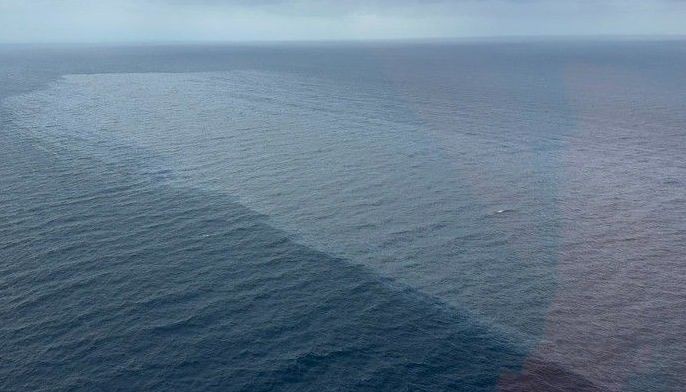MANILA, Philippines — A coalition of environmental advocates and local stakeholders called on the government to urgently contain an oil spill caused by a sunken tanker, saying this could threaten the already fragile Verde Island Passage and the livelihoods of people who depend on the marine corridor.
The Philippine Coast Guard is monitoring a spill of diesel fuel stretching several kilometers after oil tanker MT Princess Empress sank off the coast of Oriental Mindoro. The vessel was carrying 800,000 liters of industrial fuel.
Related Stories
Oriental Mindoro is one of the five provinces surrounding the Verde Island Passage, which is considered by scientists as the center of the center of the world's marine biodiversity.
“Fish may experience reduced growth and the turbid waters will make it harder for seagrasses and corals to grow,” said Fr. Edwin Gariguez, convenor of Protect VIP.
“We are concerned that fishing activities will be restricted if the spill is not addressed soon. Potential fish kills due to the oil spill may cause lesser fish stock out of the already dwindling fish catch,” he added.
Gariguez also expressed concern that the fish caught in the area might be unsafe for consumption.
Over two million individuals, such as fishers and those working in the tourism sector, rely on VIP for food and income.
“We are calling on the government to expedite clean-up operations to minimize the damage and allow the people who depend on the riches of the sea to resume their normal activities,” Gariguez said.
In a statement on Tuesday, the Department of Environment and Natural Resources said it is “monitoring the site in relation to the potential marine biodiversity impacts and the possible risk to lives and livelihoods in the area.”
While it monitored a spill of diesel fuel, the PGC did not find in the sea any industrial fuel oil from the vessel’s cargo. The agency said it would install an oil spill boom to control the spillage.
LNG expansion
VIP—which covers the provinces of Oriental Mindoro, Occidental Mindoro, Batangas, Romblon and Marinduque—is the epicenter of the country’s liquefied natural gas expansion.
According to the Center for Energy, Environment and Development, the VIP houses five operational gas plants. It is also the site of eight proposed gas plants and seven planned LNG terminals.
“This is not the first accident in the VIP nor will it be the last if the push for more LNG terminals will not be stopped. The more tankers ply these waters, the higher the chances another such accident will occur, even if all precautions are taken,” CEED executive director Gerry Arances said.
He called on the government to reconsider its pivot to importing LNG as a solution to the country’s power crisis.
Natural gas has been pitched as a “bridge fuel” that can help the shift to a lower-carbon economy. Climate and energy campaigners, however, say that fossil gas produces potent greenhouse gas methane, and blocks the transition to cleaner and cheaper sources of energy.
In August 2006, an oil tanker sank off the coast of Guimaras, spilling half a million liters of bunker fuel and affecting hundreds of hectares of mangrove forests. It is the worst oil spill in the country’s history.
“This should have been a warning sign to the government that relying on fossil fuels like oil poses massive damage to the environment but it seems like they haven’t learned a lesson,” Arances said.


